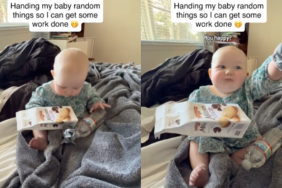There’s a famous joke in my family that my mum made up and would recycle with each of her kids when they reached a certain age.
“You know when I told you I loved you?” she would drawl, sweet as pie.
All of a sudden her lids would deadlock over her eyes and her voice would take on that unsmiling acerbity trademarked by Jafar in Aladdin:
“Well, I lied.”
Seeing the look on our faces—our eyes widening as we weighed up the 99% probability that she was joking versus the 1% possibility that she actually might not love us with all of her being—cracked her up. I have to admit that there’s a certain wicked hilarity in teasing the bedrock of a relationship built on your own blood, breast milk, and tears.
As I’ve become a mum myself, I see that the truth of a mother’s love is far more complex than the cliches let on. According to wisdom found everywhere from parenting websites to nappy commercials, Instagram pics to advice-toting female relatives, the bond a mother has with her child is deep, instinctive, life changing, and immediate. This is love with a capital L: a profoundly tender and passionate affection that leaves you breathless and inspires spectacular birth announcements to share with the world.
After birth, things get a little rocky as the reality of nappies, vomit, and sleepless nights sinks in. Then the toddler years take it up a notch, what with the screaming, kicking, biting, and the fact that instant porridge isn’t, well, instant. But ask any mum and she’ll be the first to tell you, “It’s tough, but I love it and wouldn’t change anything for the world!”
RUBBISH.
Let’s get real here: I’ll be the first to admit that sometimes I don’t love it and I would change it.
If you feel the same way, you are not an idiot. If your role as a mum of a newborn was a job that demanded the same thing on the same salary (zero)—you’d likely quit. And, at some point, that’s what every mum wants to do. So what keeps us going? It’s a little bit different for all of us.
Well, in my case, it was pride and not wanting to be seen losing my shit, plus respect for my mother and wanting to live up to the incredible energy she put into me, mainly. You know what didn’t factor in? That supposedly all-powerful “love.”
I was twenty-six when I gave birth to my first child, and there was no deep, instinctive, life-changing, and immediate connection. And unlike other mums who confess their love blossomed over time, I’m fine with the fact that after seven years, my relationship with my kids hasn’t really changed.
When Miss Seven was a bub she was a fiercely spirited, insanely brittle child with zero tolerance for putting on clothes, eating food, or sleeping. Among her seven-month-old pet hates were me holding her in the pool (clearly I was holding her back), carrying her up the stairs (clearly I was stopping her from climbing), and giving her cuddles or kisses or showing any affection at all (she happily responded by clawing my eyes or ripping out a fistful of hair—whichever was closer).
With her in tow, I couldn’t even think about stopping to buy food or supplies at a shop of any description.
Of course, now that mums have taken to the internet en masse, I realise my experience isn’t unique. Many mums struggle with their little ones over these same—and many other—frustrating things.
In comparison to lots of families, ours is a blessed home of health and laughter—and that’s something I am massively thankful for. Miss Seven has grown into an independent and quick-witted young girl. She’s the first to scream and the first to say sorry, and she’s earned the nickname “Spartan Child” from my family based on her uncanny similarity to Gerard Butler’s character in 300.
But do I love the screaming, punching meltdowns? Of course not.
In her story “Parenting Advice: Don’t Kill Them,” Ijeoma Oluo says that as a society we pretend that good mums enjoy every minute of parenthood.
This is to keep women from questioning the unequal burden that motherhood places on them. This is to keep women from asking for more. This is to keep women quiet. And it’s dangerous. It’s dangerous and invalidating and oppressing.
You have this baby and it’s not at all what everyone told you. You don’t know what to do with feelings of anger and frustration. You are a bad mother, you know this because you are the only mother feeling this way. You have nobody to talk to, nobody who can help. What would otherwise have been a fleeting moment of frustration turns into an indictment on your fitness as a mother. It prevents you from appreciating the good times. ‘You don’t deserve to enjoy this,’ you think. ‘You are a bad mother.’
The fact is, I reckon every mother has dark thoughts—we just don’t often feel allowed to say them out loud.
When Miss Seven was less than a year old I remember nights of her crying; crying so much that my boyfriend and I would scurry out of our tiny apartment block at 3 AM and take turns walking up and down the nearby parkland in her sling until she cried herself to sleep.
When she was three, I remember loading her into the car seat, using my body weight to pin her little frame to the seat, then feverishly beating down her hands while she hissed with her back-arched. On the way to daycare, she’d be screaming the whole way.
Oluo writes:
There will be nights where you are so tired that your legs are shaking. You are holding the world’s worst baby who is only quiet when you are pacing the floor and screams the moment you put him down. You will feel a rage building inside of you that is hotter than any rage you have ever felt in your life. ‘I JUST WANT TO LOVE YOU WHY ARE YOU TRYING TO DESTROY ME’ your brain will scream. This is when you need to put the baby down for a minute, even if he’s screaming. You need to brace your arms and think ‘Don’t shake him. Don’t throw him’ and put him in the crib much more gently than he deserves. Walk out of the room. If necessary, walk out of the house. Just for a few moments, just until you can breathe again.
When I was thirty-three I had my second child, another little girl, and these first nine months have been the most shocking of my life. This baby wakes up smiling. This baby loves cuddles and kisses, and when I hold her she burrows into me with a sigh of contentment so profound she’s almost purring. She instinctively does things that make parenting infinitely easier for me—like holding her own bottle and playing quietly for ten minutes in her cot when she wakes up. Almost every afternoon I spend an hour rolling and tickling and blowing raspberries with her on the bed—who’s revelling in ridiculous maternal cliches now!?
It is more enjoyable being a mum this time round? Hell, yes. Finally, I get it.
Do I love my second baby more than my first? Well, I consider every single moment I’m not pulling a claw out of my eye a win—but that’s a gift purely for me.
What I’ve actually learned seven years down the track spent worrying that I’m a heartless, non-maternal person is that loving kids doesn’t mean loving the job of raising them.
I’ve learned that a mother’s love doesn’t have to look like the stereotype.
I’ve learned there’s such a thing as love with a little “l,” which is defined by taking all the crap someone can throw at you and still snuggling next to them in bed, having wacky late-night conversations and melting at the smell of their hair on the pillow beside you. And who’s to say that love—love that isn’t conditional on enjoyment—isn’t the strongest of all?
My first child needs structure and stimulation—she’ll let me know when she needs something else. My second bub needs cuddles and closeness—ditto. Listening, adapting, being there—THAT’S what parenting is about for me.
The less black-and-white cliches I’ve had shoved down my throat about “a mother’s love” and the more freedom I have to express—and feel proud of—the myriad emotions that my children elicit and need, the better.
No child is the same; no parent either.
Insisting that there’s this one-size-fits-all definition of a mother’s love is dumb at best, and downright destructive in reality. Besides, after all the nappies I’ve changed, vomit I’ve cleaned, kisses I’ve landed, and cuddles I’ve gotten back, when these girls are around ten years old I can’t wait to see their eyes widen when I say, “Well, I lied.”
image: Getty / Marc Romanelli
More Mom Confessions:








